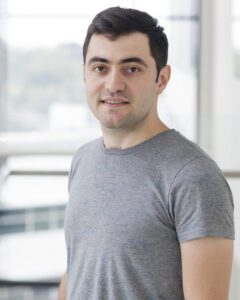Kamran Khammadov is a PhD student at NexSys. The title of his NexSys project is “Investigation into Green Hydrogen and Reversible Electrolysers.”

In December, Kamran participated in the 14th International Conference on Hydrogen Production and presented a paper titled ‘Long-term Assessment of Hydrogen Technology Deployment for Large-Scale Decarbonization of Power Production.’ The paper was selected as 1st place winner for Best Poster Award at the conference. We caught up with him in this interview.
Q.What is your NexSys research about and what are you working on at the moment?
A. Hydrogen has the potential to substitute fossil fuel usage in energy systems to reduce carbon emissions. My project is focused on the long-term assessment of hydrogen production, storage, and utilisation technologies. Currently, I am working on the integration of green hydrogen technologies, such as electrolysers, fuel cells, and hydrogen turbines, into a large-scale power production system to achieve decarbonisation goals. The study aims to contribute valuable insights to investment decisions and policies regarding the role of green hydrogen in the energy transition.
Q. How did you become interested in this research field?
A. I worked for an energy company that supplied conventional energy sources to people and industry, and I was informed about the challenges associated with the energy transition. I was interested in contributing more to global efforts to address these challenges. Investigating the potential of green hydrogen as an alternative renewable gas could provide numerous opportunities for advancing energy systems. Therefore, being a part of the research community and adding value to the development of the next generation of energy systems became an exciting ambition for me.
Q. What is one interesting fact about your research area people may not know about?
A. The next generation of energy systems is expected to comprise a blend of various technologies. Technologies aimed at reducing carbon emissions exist today and are continually improving in terms of specifications and cost. However, the energy transition is not solely about technological development; it also requires readiness and commitment from society. It is essential to follow proper strategies and policies, taking into account long-term targets, to deploy the necessary technologies in the most effective manner.
Q. What is the wider relevance of your research to the energy transition?
A. My study aims to provide insights for policies to stimulate net-zero technologies. It also investigates cost-effective pathways for the deployment of hydrogen technology, which contributes to the affordability of energy sources for society.
Q. What do you like to do outside of work?
A. I play tennis regularly and try to improve my game. Additionally, spending time in nature provides me with a refreshing escape from the daily routine. I also enjoy reading and watching content aimed at enhancing my knowledge and
comprehension of various subjects.